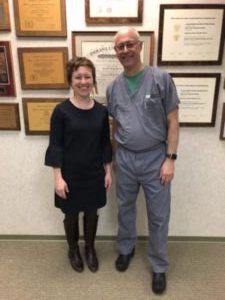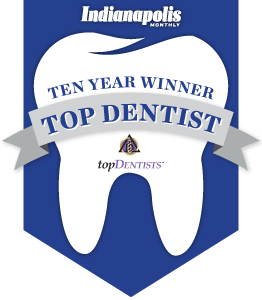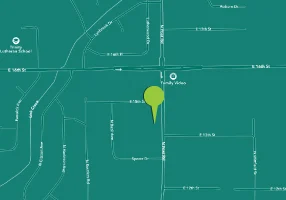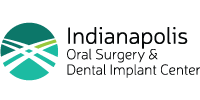Why Should My Wisdom Teeth Be Removed?
What Is An Impacted Tooth?
Experiencing tooth pain? Call Our Indianapolis Office for a Wisdom Teeth Extraction (317) 790-2555
Although most people develop and grow 32 permanent adult teeth, many times their jaws are too small to accommodate the four wisdom teeth. When inadequate space prevents the teeth from erupting they are called impacted. This indicates their inability to erupt into the proper position for chewing and cleaning.
Impacted Wisdom Teeth: A Common Condition
9 Out of 10
Did you know that 9/10 patients have at least one impacted wisdom tooth? In fact, it’s the number one reason that we remove them!
32 Teeth, 28 Spaces
Our jaws have space for 28 teeth. That is enough room to accommodate the first and second, but not the third molars (another name for “wisdom teeth”). Because these are the last to show up, there often isn’t enough room for them to grow.
What Patients Are Saying About Our Indianapolis Oral Surgeon
For your convenience, we have provided some videos of former patients talking about their procedures at Indianapolis Oral Surgery & Dental Implant Center.
What Does It Mean If A Tooth Is Impacted?
All of this crowding results in the wisdom teeth being unable to erupt through the gums properly – a condition commonly referred to as “impacted”. Often they grow in sideways, backward, tilted, and, sometimes, they may even remain completely under the surface of the jawbone.
While you may feel nothing out of place, impacted teeth are at a significant risk for becoming infected, fracturing the jaw, or damaging neighboring teeth. For this reason, it is often necessary for Dr. Falender to remove them.
Classification of Impaction: Terms to Know
Angulation:
- Mesial Impaction: The most common type of impaction, the tooth is angled forward toward the front of the mouth.
- Horizontal Impaction: The tooth is lying on its side.
- Distal Impaction: The tooth is angled toward the rear of the mouth.
- Vertical Impaction: This indicates an almost-normal orientation, where the tooth is mostly upright.
What Our Patient Have to Say About Us!
 I was having problems with my teeth, and I was getting ready to lose a bridge, and I just told my dentist, "I just don't like false teeth." And he suggested that I look into the implants, and he worked with Dr. Falender. It's a permanent denture; it is connected to my bones with four screws. The dentist will be able to take them out once or twice a year so that he can clean them and put them right back in there. So at no time will I have to go without teeth. For all my friends in Indianapolis, Terre Haute, Bloomington, Muncie, Indiana - anywhere that they can come - and if they need an All-on-4® procedure done, I highly recommend Dr. Falender.
I was having problems with my teeth, and I was getting ready to lose a bridge, and I just told my dentist, "I just don't like false teeth." And he suggested that I look into the implants, and he worked with Dr. Falender. It's a permanent denture; it is connected to my bones with four screws. The dentist will be able to take them out once or twice a year so that he can clean them and put them right back in there. So at no time will I have to go without teeth. For all my friends in Indianapolis, Terre Haute, Bloomington, Muncie, Indiana - anywhere that they can come - and if they need an All-on-4® procedure done, I highly recommend Dr. Falender.
 "I didn't realize how much TMJ was impacting my life because I'd lived with the symptoms for so long, but Dr. Falender and his staff were so compassionate, knowledgeable, understanding and helpful. I'm so glad I sought their help-they've made such a difference! Thanks for all you do!"
"I didn't realize how much TMJ was impacting my life because I'd lived with the symptoms for so long, but Dr. Falender and his staff were so compassionate, knowledgeable, understanding and helpful. I'm so glad I sought their help-they've made such a difference! Thanks for all you do!"
Wisdom Tooth Impaction
Wisdom teeth can become impacted in different ways and to different degrees, depending on how deep the tooth is within the jaw. It can occur as:
Soft Tissue Impaction
When the crown (top portion) of the tooth has penetrated through the bone, but the gum is not properly positioned around the tooth and still covers all or part of the crown, food can get trapped under the gum. This can cause infection, decay, swelling, and pain. Many people experience this problem before their wisdom teeth are removed.
Partial Bony Impaction
This occurs when the tooth is partially erupted through the gum but a portion of the crown remains below the gum and jawbone. Painful infections are common with this type of impaction because it difficult to keep the wisdom tooth area clean.
Complete Bony Impaction
An impacted wisdom tooth that has not erupted through the gums and is still completely encased in the jawbone needs more complex surgical techniques for removal. Complete bony impaction can occur with the tooth in either a vertical or a horizontal position.
Why Should My Wisdom Teeth Be Removed?
By the time the wisdom teeth erupt, there may not be enough room left in the mouth to accommodate them. When space is lacking, these third molars are not able to erupt properly or function as they should. The tooth can become impacted and stuck in the wrong position, which can cause pain, inflammation, infection, and eventually, damage to the adjoining teeth.
Reasons for Wisdom Tooth Removal in Indianapolis
Not all wisdom teeth need to be removed. Some people never grow wisdom teeth and others only grow one or two. Some fortunate individuals never experience crowding, impaction, or any other problems with their wisdom teeth and never need to have them surgically removed. When wisdom teeth become impacted, however, if left untreated, it can lead to serious problems.
Wisdom tooth removal in Indianapolis is sometimes performed as a preventative measure to stop problems from developing in the future. In most cases, the procedure is recommended when dental health problems have developed, such as:
Cavities and Decay
Wisdom teeth that are not fully erupted are difficult to keep clean and therefore susceptible to decay.
Gum Disease
Pericoronitis (inflammation of the gum tissue surrounding a tooth) is a common condition, both with wisdom teeth that have not yet erupted through the gums and with those that are partially erupted, with gum tissue still covering a portion of the crown.
Damage to Adjacent Teeth:
If there is inadequate room to clean around the wisdom tooth, the tooth directly in front, the second molar, can be adversely affected resulting in gum disease, bone loss around the tooth, and/or decay.
Infection and Abscesses
When food gets trapped under the gum tissue around a partially erupted wisdom tooth, it can cause bacteria to grow and infection to develop. When pus (dead white blood cells) accumulates in the inflamed and swollen tissue, the tooth can become abscessed and painful.
Cyst Formation:
Non-infectious diseases may also arise in association with an impacted wisdom tooth. Cysts are fluid-filled “balloons” inside the jaw bone that develop as a result of impacted teeth and slowly expand destroying adjacent jaw bone and occasionally teeth. They can be very difficult to treat if your wisdom teeth are not removed in your teenage years. Although rare, tumors can be associated with the delayed removal of wisdom teeth.
Possible Crowding:
Impacted wisdom teeth may contribute to crowding of your teeth. This is most noticeable with the front teeth, primarily the lower front teeth and is most commonly seen after a patient has had braces. There are a number of factors that cause teeth to crowd after braces or in early adulthood. Retained, impacted wisdom teeth may be a contributing factor. Unless you have an active problem when you see the oral surgeon, the reason for removal is primarily to prevent long-term damage to your teeth, gums and jaw bone.
What If I Don’t Have My Wisdom Teeth Removed As A Teenager Or Young Adult?
As wisdom teeth develop, the roots become longer and the jaw bone denser. When it is necessary to remove impacted wisdom teeth in your thirties, forties or beyond, the post-operative course can be prolonged and there is a higher complication rate. Treating these complications is often more difficult and less predictable than with a younger patient. Healing may be slower and the chance of infection can be increased. If your impacted wisdom teeth are not removed in your teenage years or early in your twenties and they are completely impacted in bone, it may be advisable to wait until a localized problem (such as cyst formation or localized gum disease and bone loss) develops. In general, you will heal faster, more predictably and have fewer complications if treated in your teens or early twenties.
We want you to know that if you have been told you have an impacted wisdom tooth (or two), you’re not alone! This common condition is one that we treat regularly in our Indianapolis office. As oral surgeons, we are specially trained to handle even the most complex cases of impacted teeth in our Indianapolis office. Please call us with any questions you may have about your wisdom teeth management.
Dr. Falender uses advanced imaging technology to detect wisdom teeth, and he can help you determine whether your third molars will pose a threat to your overall oral health. Removing your wisdom teeth before they are fully grown in is best, but Dr. Falender can remove wisdom teeth at any stage of development. Contact us today to schedule your wisdom tooth consultation appointment.
Your Smile Is Waiting For You
Give your smile a second chance; you’ve earned it. With dental implants in Indianapolis, you can once again enjoy the foods you like and smile with your loved ones – with complete confidence!
Our Team Looks Forward to Welcoming You To
Indianapolis Oral Surgery & Dental Implant Center
We hope we’re your dental home for life! You can contact us by filling out the form below. Let’s discuss your goals, swap stories, and care for your smile.
AWARDS

INDIANAPOLIS
Indianapolis Oral Surgery & Dental Implant Center
1320 N. Post Rd
Indianapolis, IN 46219
Main: 317-900-4535
Hours:
Se habla Español
SOCIAL




